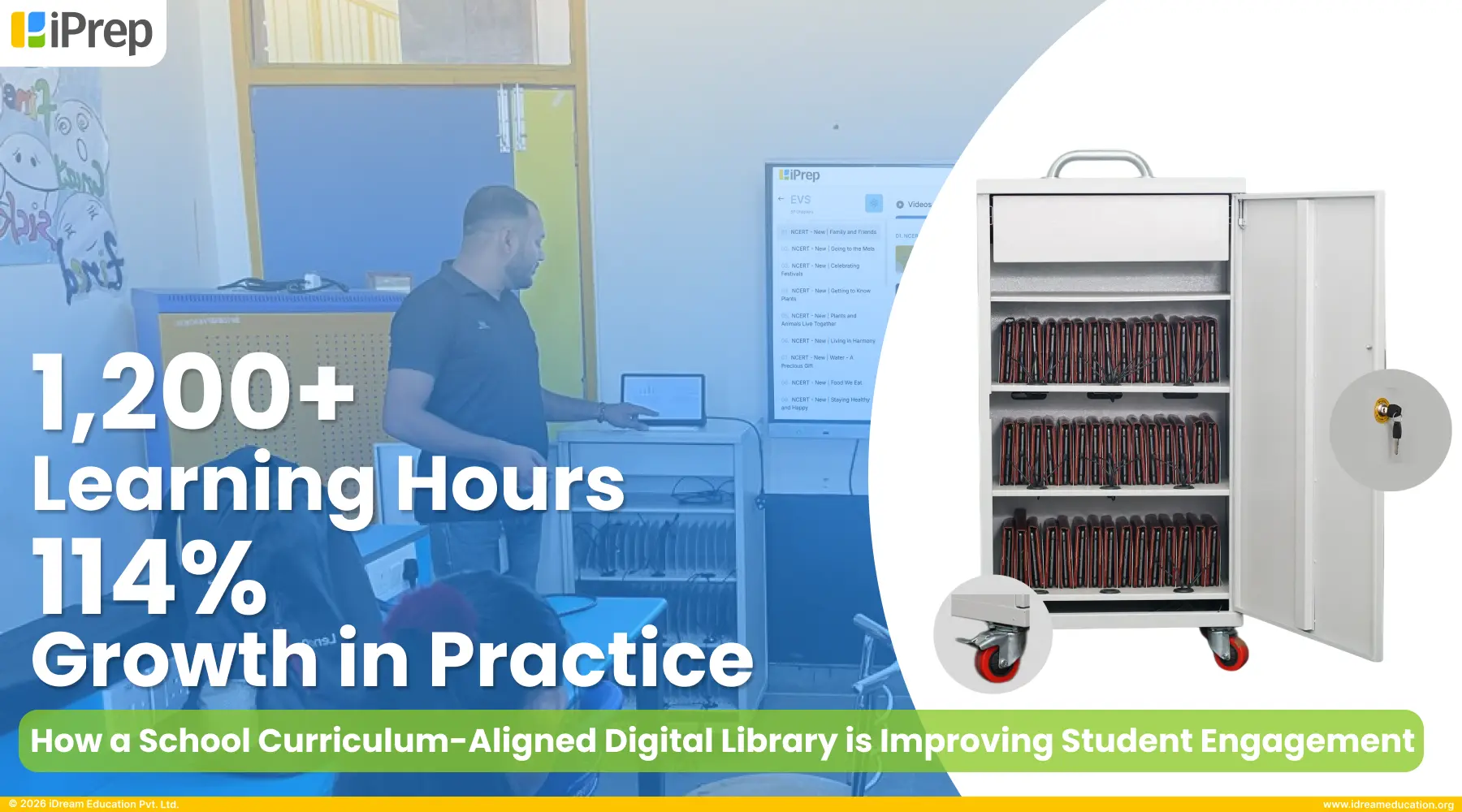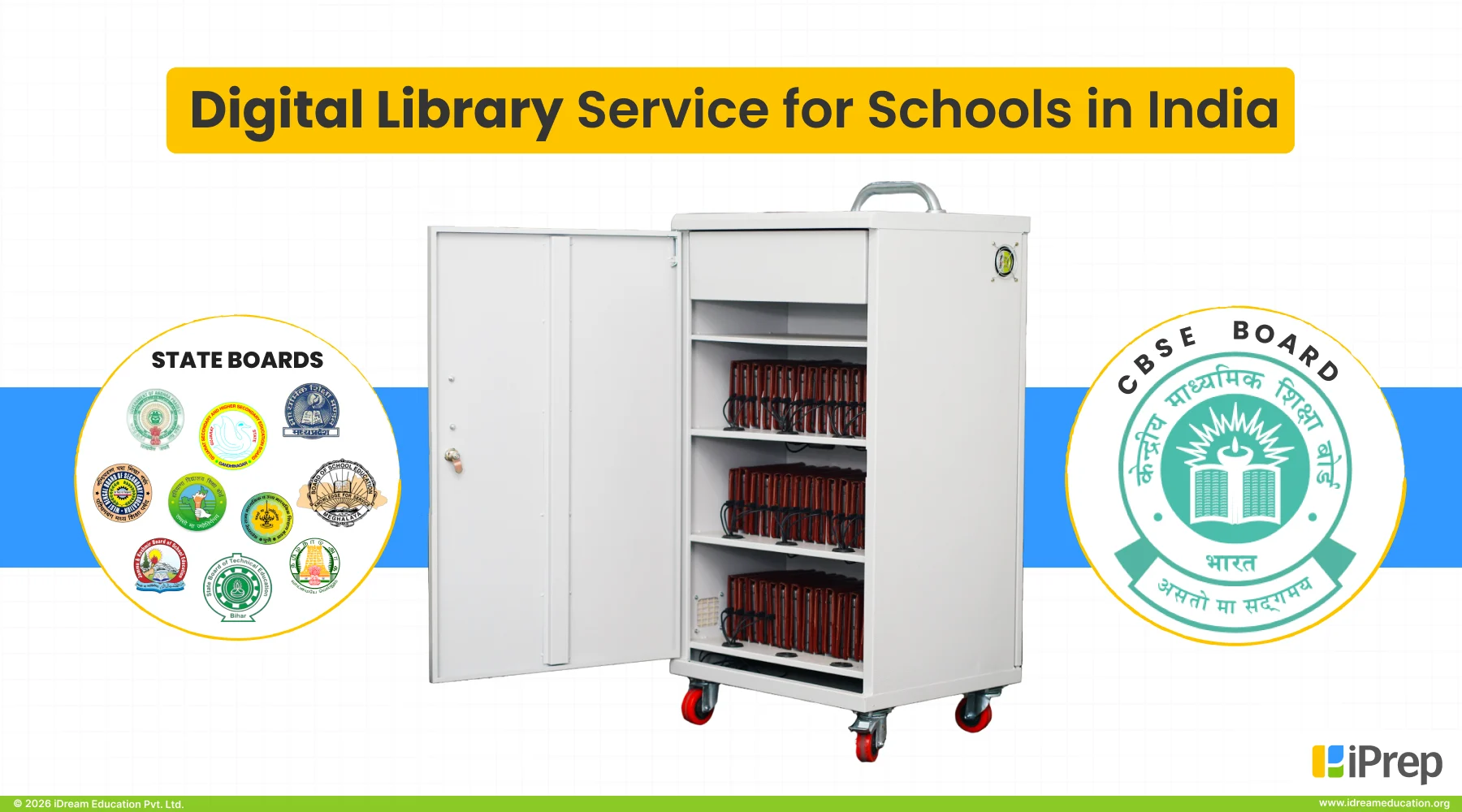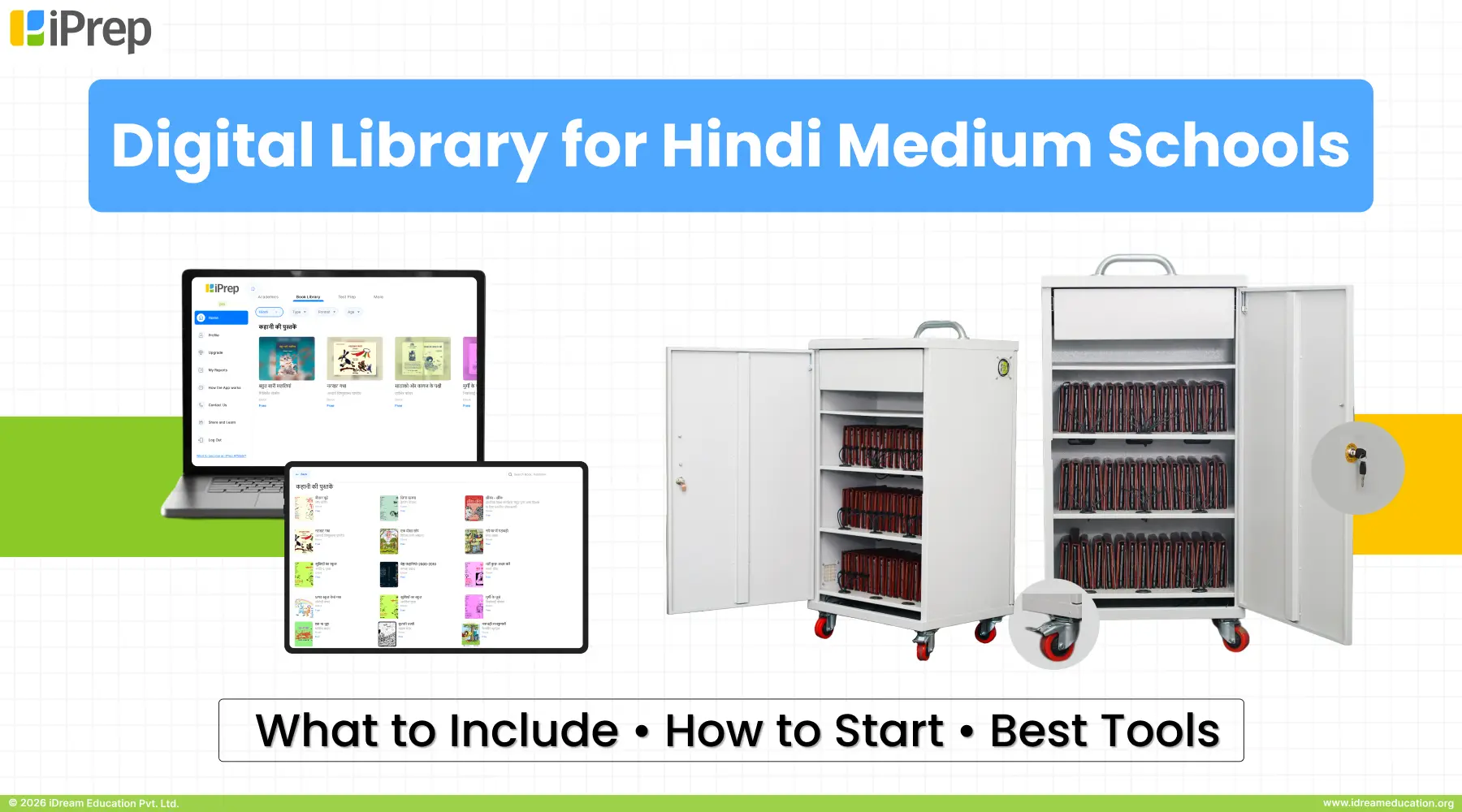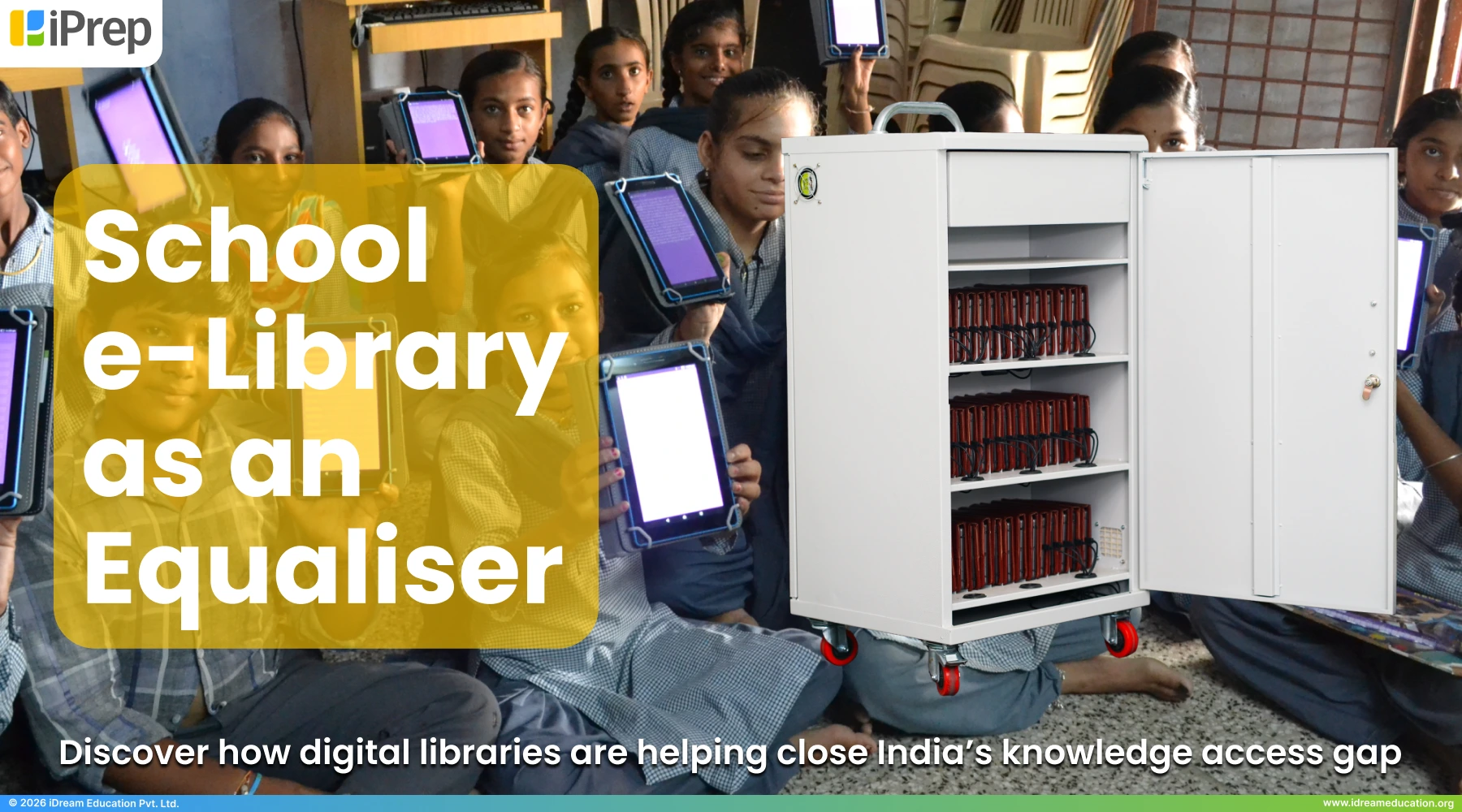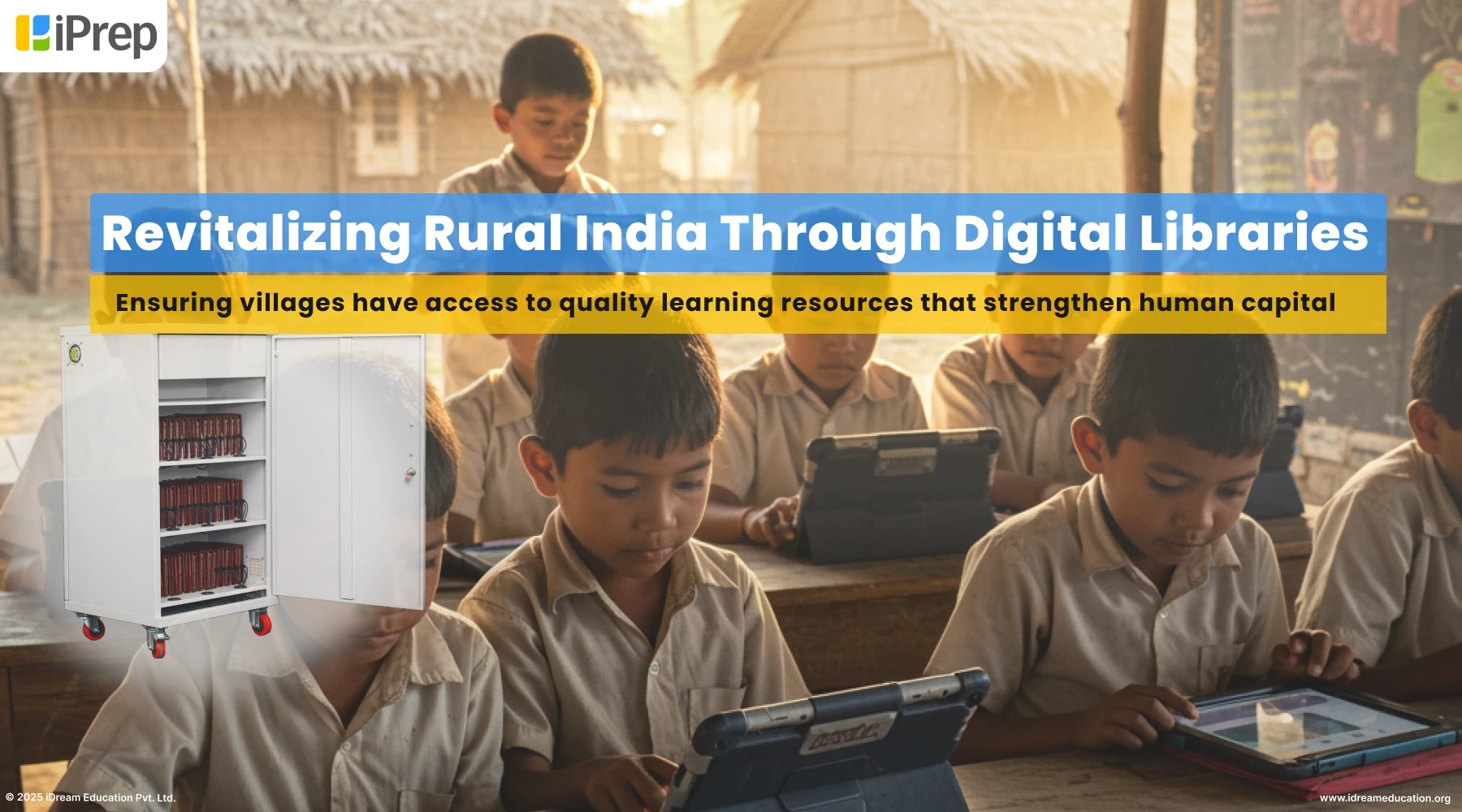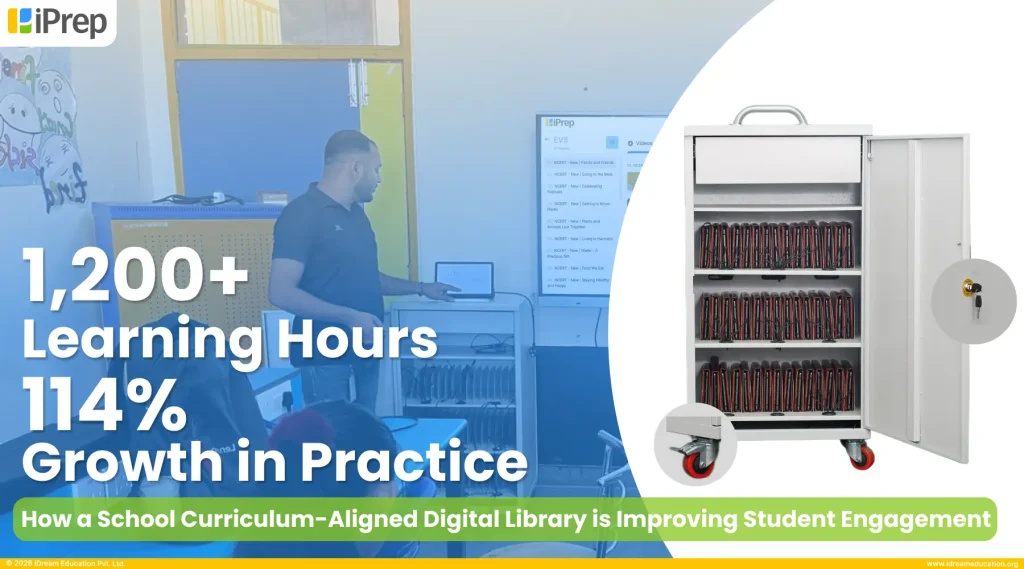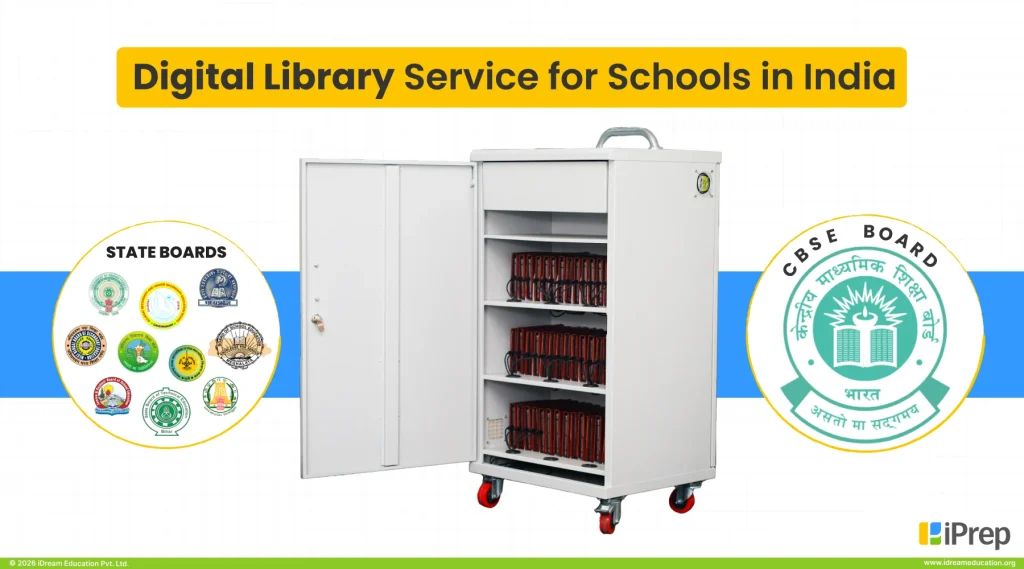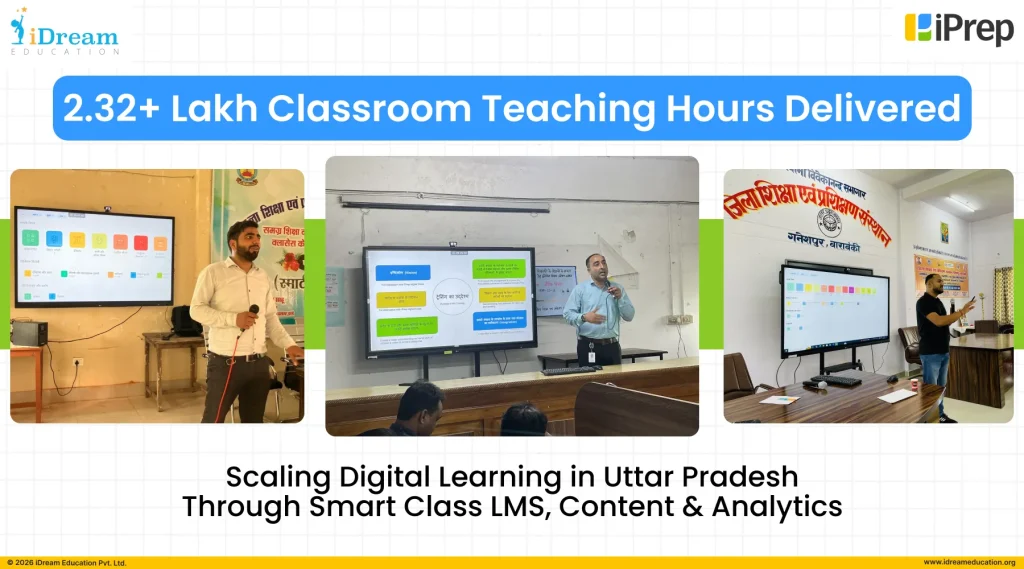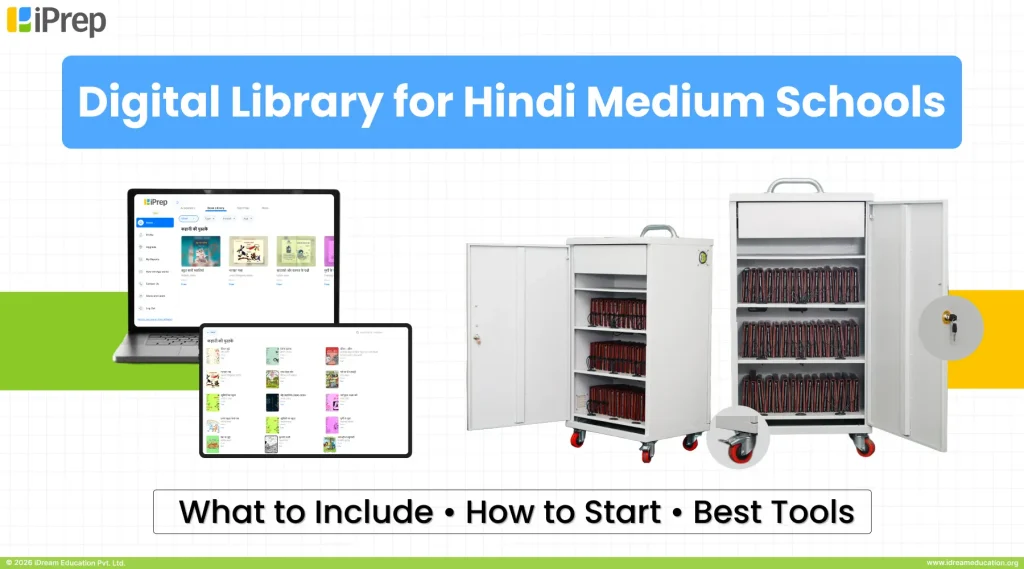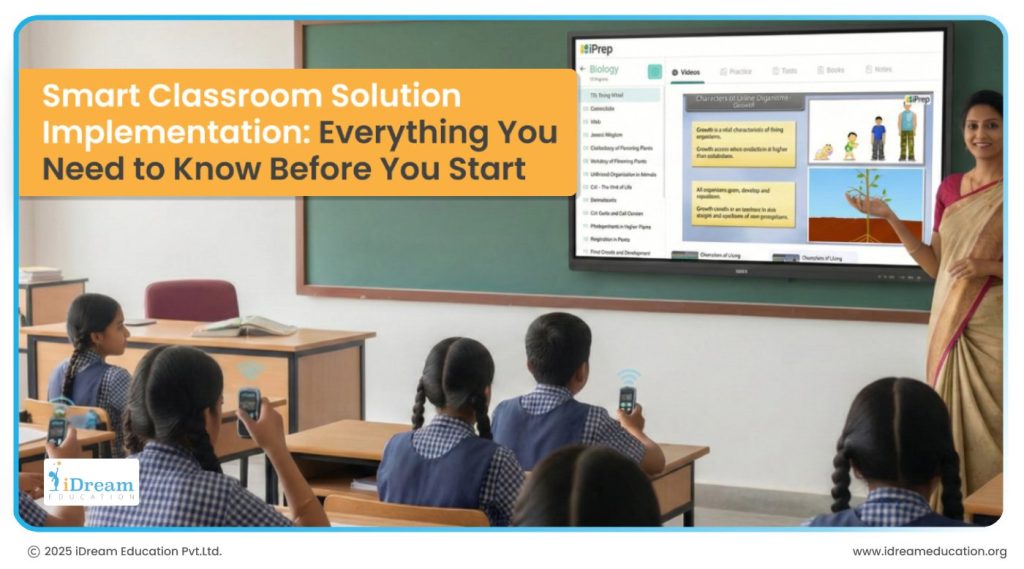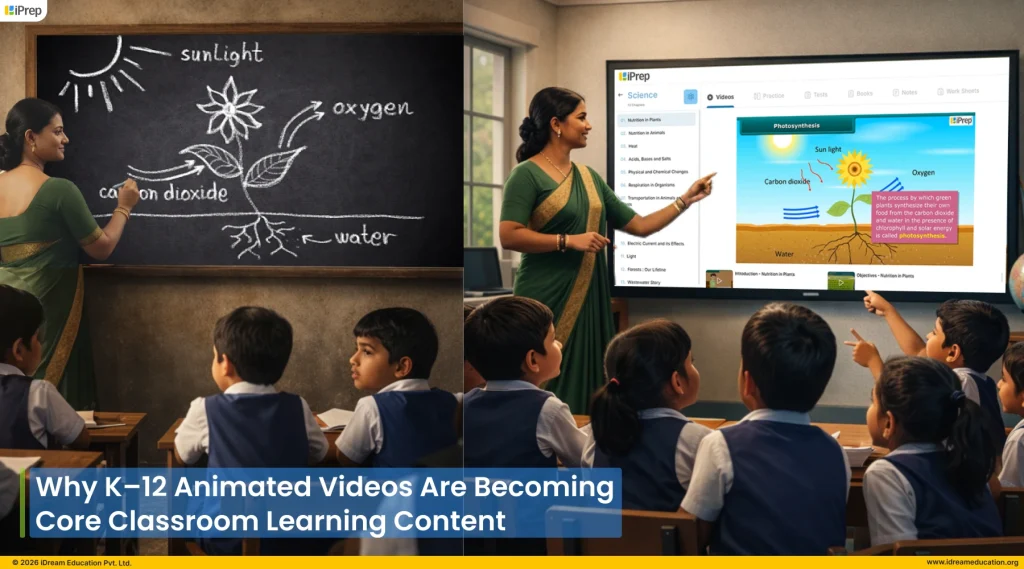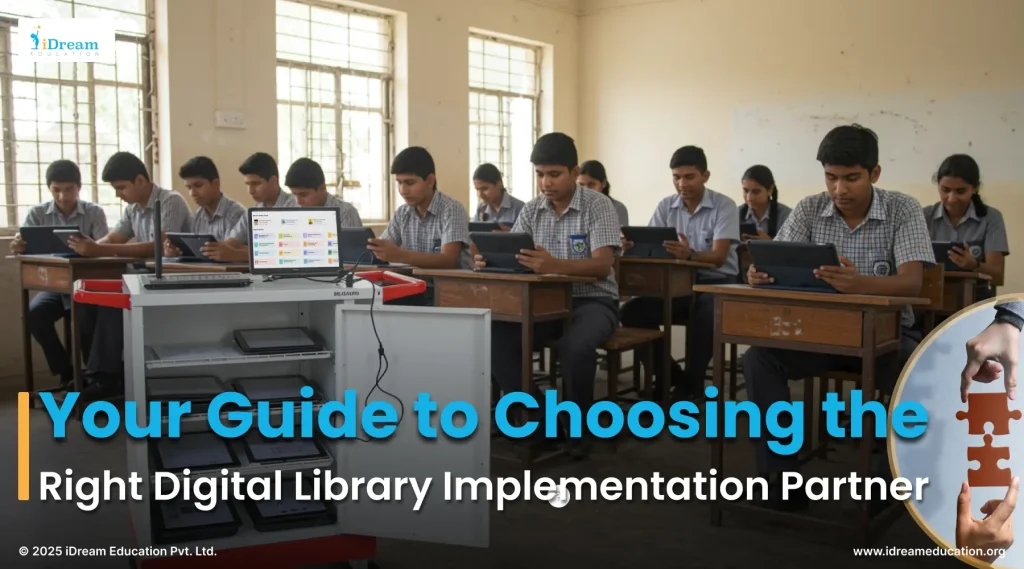
Over the last few years, we’ve had the privilege of working closely with government schools across India. And, if there’s one thing we’ve learned, it is: Access to the right learning resources can completely transform a child’s educational journey.
As more digital learning tools find their way into schools, driven by government schemes, CSR programs, and NGOs—the focus is shifting. It’s no longer just about installing smart classes or handing out tablets.
The new frontier is digital libraries – designed to bring joyful, inclusive, and self-paced learning to every child.
But as demand for digital libraries grows, so does the need for the right implementation. One implementing agency for a Digital Library that’s not just about technology, but also about accessibility, content relevance, teacher adoption, and long-term sustainability.
Because digital libraries infrastructure is not just fancy replacements for physical bookshelves. When done right, a digital library built with flexibility of project can give every student access to thousands of books across different genres, languages, and learning levels. This removes the hassle of waiting for new books or dealing with damaged copies. With offline digital library infrastructure students can dive into engaging reading material anytime they want.
But the success of such access and engagement depends heavily on how the digital library is implemented – and by whom
Not all digital library implementations are the same. We’ve seen some fizzle out after the initial excitement fades. And often, it comes down to choosing the right implementing Agency for a Digital Library Project. So, if you’re a CSR leader, an education department official, or part of an NGO planning to implement offline digital library infrastructure in government schools, there are a few critical aspects you need to consider carefully.
Here Are Some Key Things to Keep in Mind When Selecting Implementing Agency for a Digital Library Project:
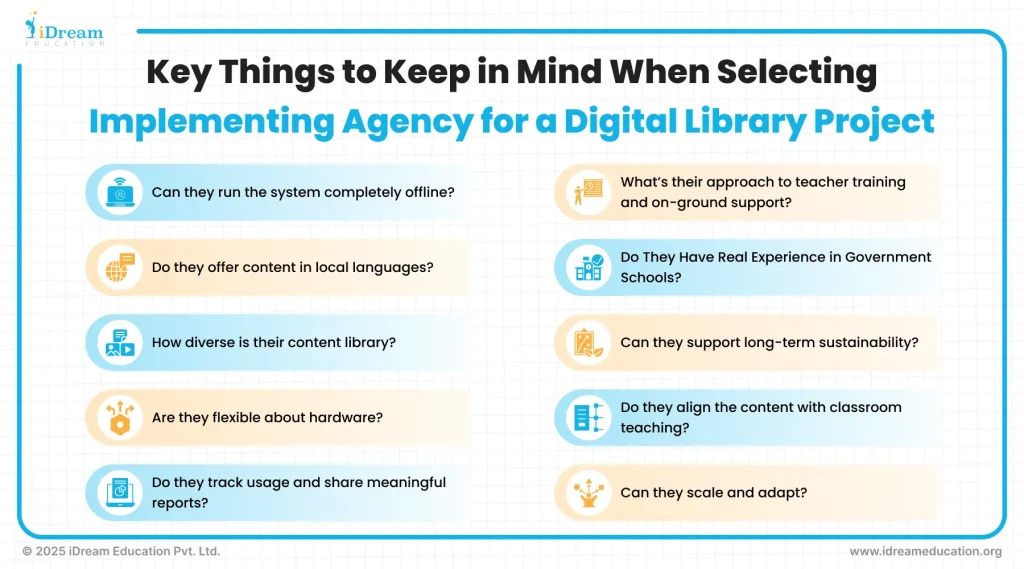
Can they run the system completely offline?
Let’s be honest, many government schools, especially in rural areas, still struggle with reliable internet access. That’s why the implementing agency for a digital library you work with must be able to deliver a completely offline e-library solution. The library LMS and all the content should work without needing the internet. We’ve seen projects stall simply because the app needed a login or content updates online. To avoid such pitfalls, it’s crucial to work with an agency that provides:
- Locally hosted solutions through either a local server setup or fully pre-loaded devices. Among the two, pre-loaded devices often emerge as a more cost-effective, scalable, and easier-to-deploy option. This is especially for schools with limited technical infrastructure.
- Zero reliance on cloud syncs or internet-based updates. This ensures that the entire digital library infrastructure continues to run smoothly even in completely offline conditions.
- A seamless user experience that doesn’t degrade in no-network zones. This allows both students and teachers to access content effortlessly anytime.
Do they offer content in local languages?
When a child hears a poem or story in their own language, their eyes light up. Language makes learning personal and they connect instantly. That’s why one of the key criteria for selecting an implementing agency for a digital library should be the one who offers content in local and regional languages. An effective digital library must include:
- Storybooks and textbooks in the state’s local language, aligned with the curriculum where possible. This ensures familiarity and relevance.
- Audio-visual content with voiceovers in local languages, helping children better understand and enjoy the material.
- Bilingual content options, enabling students and teachers to easily switch between English and the regional language. This not only supports comprehension but also builds comfort with both languages over time.
How diverse is their content library?
A digital library should feel like a treasure chest. We’ve seen students get hooked on books about space, science fiction, folk tales, and even biographies. Their curiosity expands when they have access to content that goes beyond the standard curriculum. So, don’t just ask how many books the implementing agency offers, instead ask what kinds of books they provide. Variety is key to sparking and sustaining a child’s love for reading therefore when selecting an implementing agency for a digital library, ensure they offer:
- A mix of fiction, non-fiction, poetry, and comics to cater to different reading moods and styles.
- Biographies, science stories, and general knowledge books that inspire curiosity and broaden perspectives.
- Books that are appropriate for different grades, reading levels, and interests, ensuring inclusivity across all age groups.
- And most importantly, proper categorization of books by age and grade level. This helps students and teachers easily find content that’s developmentally appropriate and educationally relevant.
Are they flexible about hardware?
Every school has a different setup and budget. Some can go for tablets, others prefer laptops or a local server-based setup. That’s why hardware flexibility is non-negotiable when choosing an implementing agency for a digital library project. The right agency should never push a one-size-fits-all hardware solution. Instead, they should offer guidance and support tailored to your project’s goals, school conditions, and available resources. Look for an implementing agency that:
- Is hardware-neutral, meaning they don’t tie their solution to a specific brand or device.
- Recommends hardware based on what’s best for the school, not what benefits their own sales or margins.
- Ensures full platform compatibility. Their library LMS and e-library content should work seamlessly across a range of devices and operating systems, including Android, Windows, Linux, Tizen and Chrome OS.
Do they track usage and share meaningful reports?
Once the library is up and running, how do you know if it’s being used well? That’s where data tracking comes in. We’ve worked on programmes where teachers and administrators could see exactly which books were being read and by whom. It made a huge difference in how the library was managed. While evaluating the implementing agency for a digital library, make sure they offer:
- Student-wise and class-wise usage tracking, so you can monitor engagement across different levels.
- Online dashboards tailored for CSR teams, education department officials, or NGO coordinators. This offers real-time visibility into how the project is performing.
- Insightful reports that not only show usage statistics but also help in improving content strategy, boosting student engagement, and even linking reading habits to learning outcomes.
What’s their approach to teacher training and on-ground support?
Technology can be intimidating for teachers if not introduced right. One-time training sessions don’t work and we’ve seen that firsthand. That’s why the implementing agency for digital libraries must go beyond just setting up devices. They should be truly invested in the success of the digital library infrastructure by offering consistent, hands-on support tailored to the school context. Here’s what to look for:
- A team that’s willing to spend time building trust with teachers, understanding their challenges, and guiding them step by step.
- Experiential and ongoing training, delivered in local languages, that equips teachers not just to use the platform but to integrate it meaningfully into their daily routines.
- Help in embedding the digital library into classroom activities, making it a part of everyday teaching and not just an add-on.
- On-ground support staff who can visit schools when needed to troubleshoot issues, conduct refresher sessions, and reinforce best practices.
Do They Have Real Experience in Government Schools?
Digital library projects in government schools come with their own set of realities This includes setting up e-libraries in limited infrastructure, varying teacher comfort levels, and administrative processes. That’s why it’s important to partner with an agency that doesn’t just talk the talk, but has actually walked the path. Ask for their past work. Not just a presentation, but stories from the ground. Schools where they’ve worked, challenges they’ve solved, and improvements they’ve seen in reading levels or attendance. A reliable implementing agency for a digital library should:
- Understand how government schools function, including timetables, resource availability, and operational constraints.
- Be comfortable working directly with school principals, teachers, block-level officers, and district education authorities—as collaboration across roles is essential for success.
- Be able to navigate practical challenges – like power cuts, timetable shifts, or limited manpower—with flexibility and on-ground problem-solving.
Can they support long-term sustainability?
One of the saddest things we’ve seen is a digital library full of potential, sitting unused a year later because no one maintained it. When evaluating an implementing agency, look beyond deployment timelines and ask: What happens after the digital library setup is complete? A truly committed agency should offer:
- Regular tech support, including remote and on-site assistance to keep devices and platforms running smoothly.
- Content updates that work without internet connectivity, through SD cards, pendrives, or local server syncs.
- Mechanisms to collect feedback from teachers and students, so the library evolves based on real needs from the ground.
- A clear and practical plan for long-term sustainability, including local ownership, periodic check-ins, and provisions for ongoing engagement and training.
Do they align the content with classroom teaching?
Reading for fun is important but when digital libraries support classroom learning, their value goes up tenfold. So, when assessing an implementing agency for digital library, ask if their content is:
- Mapped to the state curriculum or aligned with foundational literacy and numeracy goals, especially for early grades.
- Designed to complement subjects such as Environmental Studies (EVS), Mathematics, and English, so teachers can use it to reinforce lessons.
- Useful for both free reading and guided reading sessions. This provides flexibility for different learning scenarios.
Also, since devices are already being deployed, take this opportunity to think bigger: Can the Digital Library with PAL also be implemented in schools? An ideal partner will not only provide a digital library but also help you integrate it with PAL capabilities. This gives access to a single, unified platform that supports both curriculum-aligned learning and joyful reading. This kind of integration maximizes your investment and creates a more holistic digital learning environment.
Can they scale and adapt?
If your pilot works well, can the agency scale it up? Can they customize the setup for different geographies, states, or languages? Can they keep evolving with policies like NEP 2020? The real impact happens when a digital library program scales across multiple schools, districts, or even states, without losing its effectiveness. That’s why your implementing agency for a digital library must not only think big but also adapt intelligently to diverse educational contexts. As you evaluate agencies, ask:
- Can they handle large-scale rollouts across multiple schools or districts, while maintaining quality and support?
- Do they offer flexible deployment and licensing models, whether you want a centralized server setup, device-based access, or hybrid options?
- Are they responsive to evolving policies like NEP 2020, and can they align their offerings with new government frameworks, learning goals, or assessment guidelines?
- Can they customize the platform for different geographies, languages, and educational needs?
Closing Thoughts
Setting up a digital library is not just a hardware project, it’s a learning ecosystem. When you choose the right implementing agency for digital library setup, you’re giving students the tools to read, imagine, and grow. But choose wrong, and the devices may end up locked in a cupboard.
At iDream Education, we’ve seen the joy in students’ eyes when they discover books they love and the confidence that comes when teachers feel supported. We’ve also learned, sometimes the hard way, what makes a project sustainable.
So whether you’re a CSR leader, NGO, or education department officer, we hope this guide helps you ask the right questions. Because in the end, the success of a digital library isn’t about the tech, it’s about the children who use it.I


